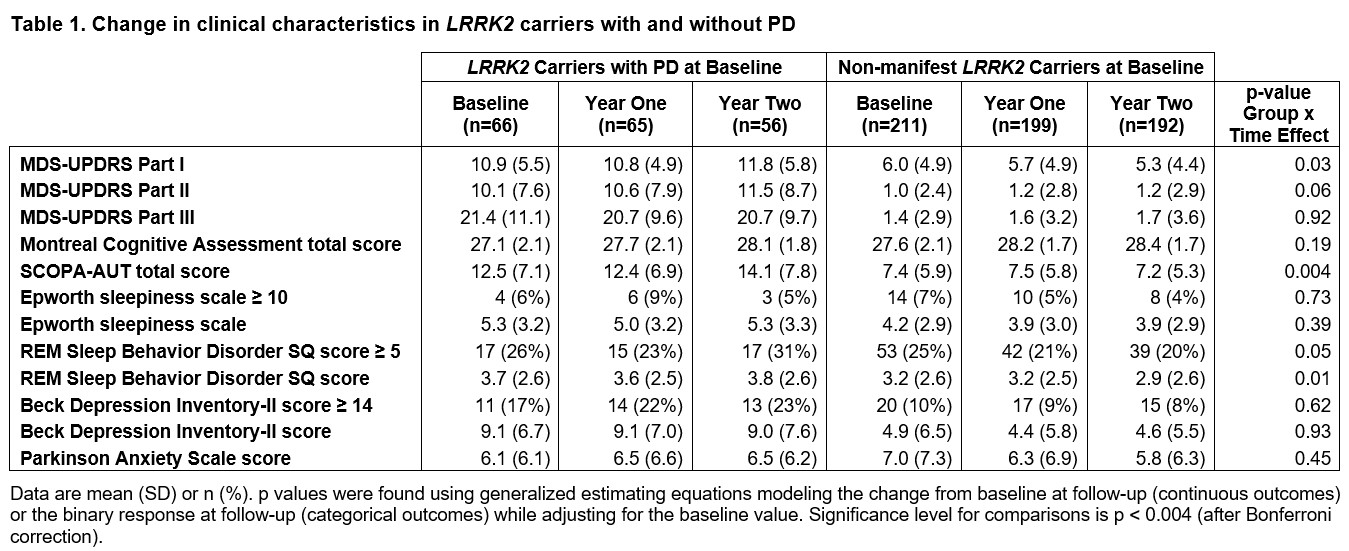Category: Parkinson's Disease: Genetics
Objective: To examine change in clinical characteristics in LRRK2 G2019S carriers with Parkinson’s disease (PD) and without PD (non-manifest carriers) enrolled in Virtual Assessment of LRRK2 carriers to Optimize Parkinson’s disease research (VALOR-PD) over two years.
Background: The LRRK2 G2019S variant is a common genetic cause of PD and exhibits incomplete penetrance. Long-term, longitudinal studies are needed to identify the earliest signs of LRRK2 PD and understand the transition to PD.
Method: In this 36-month remote study, LRRK2 G2019S carriers with and without investigator-determined PD complete annual on-line assessments and video-based visits. Participants complete assessments of motor and non-motor symptoms (Epworth Sleepiness Scale, Beck Depression Inventory-II, Parkinson Anxiety Scale, Scales for Outcomes in Parkinson’s disease-Autonomic Dysfunction (SCOPA-AUT), REM Sleep Behavior Disorder Screening Questionnaire (RBDSQ), Movement Disorder Society-Unified Parkinson’s Disease Rating Scale (MDS-UPDRS) Parts Ib and II). Participants undergo a modified motor examination (MDS-UPDRS Part III) and non-motor assessment (MDS-UPDRS Part 1a) with an investigator and cognitive assessment (Montreal Cognitive Assessment) with a study coordinator. Mean (standard deviation) or n (%) are reported for each assessment at each time point over two years. Generalized estimating equations model the change from baseline to follow-up or the binary response at follow-up while adjusting for the baseline value. Multiple testing is accounted for by applying Bonferroni correction.
Results: At baseline, 66 LRRK2 carriers with PD were mean (SD) age 67.7 (8.7) (96% white, 50% female, 80% Ashkenazi Jewish) and 211 without PD were age 53.3 (15.0) (95% white, 59% female, 73% Ashkenazi Jewish). At year one, 65 (98%) with PD and 199 (94%) without PD completed assessments. At year two, 56 (85%) with PD and 192 (91%) without PD completed assessments. LRRK2 carriers with PD scored worse than non-manifest carriers on several clinical assessments at every time point. With the exception of the SCOPA-AUT (p=0.004), there were no significant between group differences in rates of longitudinal change over two years (Table 1).
Conclusion: Over two years, longitudinal change in most clinical assessment scores did not differ between groups. Longer follow up and more sensitive measures of disease progression are needed.
To cite this abstract in AMA style:
S. Lettenberger, P. Auinger, R. Wilson, E. Hartman, M. Pawlik, M. Khokhar, E. Dorsey, B. Valdovinos, S. Sharma, R. Holloway, C. Tanner, R. Alcalay, R. Schneider. Longitudinal change in clinical characteristics of LRRK2 carriers in a remote cohort [abstract]. Mov Disord. 2023; 38 (suppl 1). https://www.mdsabstracts.org/abstract/longitudinal-change-in-clinical-characteristics-of-lrrk2-carriers-in-a-remote-cohort/. Accessed February 28, 2026.« Back to 2023 International Congress
MDS Abstracts - https://www.mdsabstracts.org/abstract/longitudinal-change-in-clinical-characteristics-of-lrrk2-carriers-in-a-remote-cohort/

